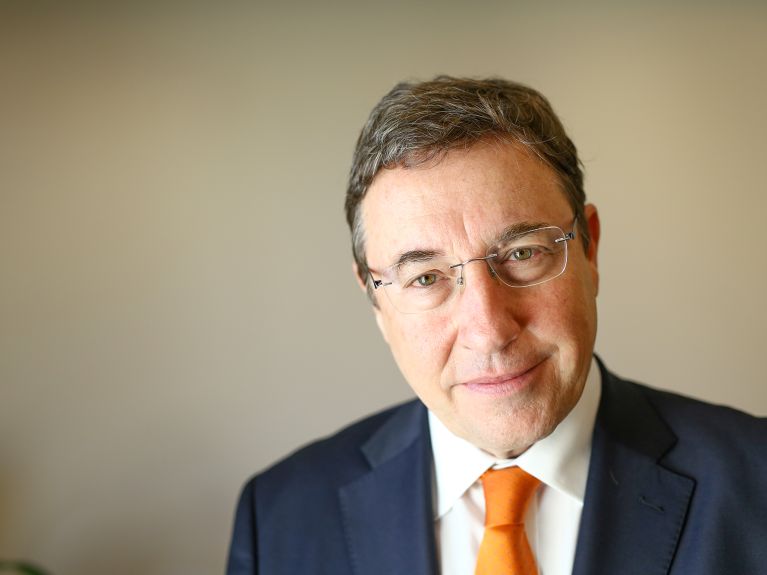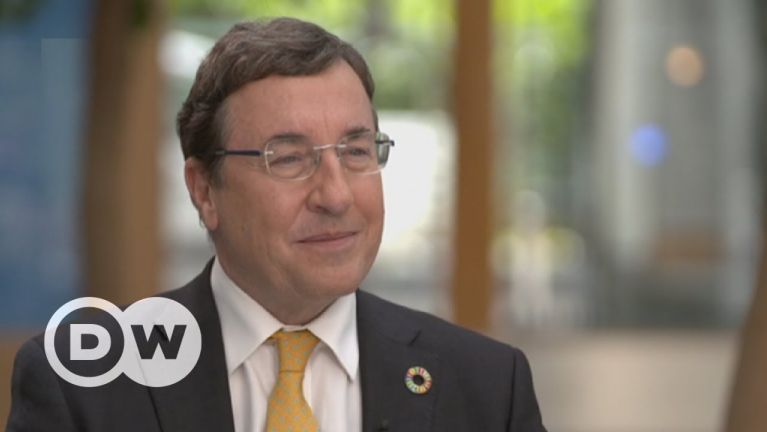Better organisation to help more quickly
UNDP Administrator Achim Steiner explains in our interview how digitisation is driving forward sustainable development, though he also warns about data abuse.

Achim Steiner is currently the highest-ranking German at the United Nations. Since 2017 he has headed the UN Development Programme (UNDP), which is active in 170 countries around the globe and has an annual budget of 4.6 billion dollars. In our interview, Steiner explains why he does not regard the United Nations as anachronistic in the least – despite all the criticism and crises.
Mr Steiner, we are living in an era of radical change, which encompasses everything from growing populism and geopolitical power shifts to the energy transition and digitisation. The international system as we knew it is under fire. Are you sometimes worried about the future of the UN?
Worried is not the right word. However, it is true that we must think about how to preserve this international system that we have laboriously built up over the course of seven decades. After all, despite all the criticism and the frequently expressed perception that not enough happens here, it is an amazing organisation. The United Nations makes many things possible for the world that never before existed in human history and that one does not automatically associate with it.
The United Nations is an essential part of our modern world.
What, for example?
It allows international trade, aircraft to fly over national borders, letters to be sent from one country to another, pandemics to be jointly combated, the effectiveness of medical drugs to be assessed, people to be given access to the Internet, and much, much more besides. It creates rules, norms and standards without which our lives would be far more difficult. That is what makes the United Nations an essential part of our modern world.
Can you also give some examples from development policy?
We at the UNDP work in 170 countries every day, doing everything from combating poverty to promoting democratic elections and developing renewable energies. We also support countries in times of crisis. For example: each day 90 million people receive food aid - that’s 90 million people who will not starve today. That is a huge logistical accomplishment that we undertake on behalf of the international donor and world community – and we do so at a very reasonable price. Our employees often risk and sometimes lose their lives in doing this. Despite all the criticism and all the setbacks, one should sometimes take a rather closer look at what is actually being done. It is easy to criticise, but finding constructive solutions and making things better costs effort and strength.
Dieses YouTube-Video kann in einem neuen Tab abgespielt werden
YouTube öffnenThird party content
We use YouTube to embed content that may collect data about your activity. Please review the details and accept the service to see this content.
Open consent formOne criticism directed at the UN is that it doesn’t keep up with the times and ignores developments.
That is both true and not true. Take digitisation, for instance. Changes are happening so fast that many people are rushing just to keep up. 90 percent of the information that is online today was posted in the last two years. Digitisation offers huge opportunities, not least when it comes to developing and achieving the Sustainable Development Goals – SDGs. Thanks to digitisation, we can organise many things more efficiently and thus have an impact more quickly – for example using drones to assess the progress of projects in crisis regions. Or by using agricultural apps that help identify the best moment for harvesting. Or financial transfers that allow even people who have no bank account to send and receive money via their mobile phone. There are so many opportunities, and we are only aware of the tip of the iceberg. There are also many risks, however.
Which risks do you envisage?
I am thinking of the fact that a handful of large companies must not be allowed to dominate the world. That data should not be abused, that a person’s digital profile should not be more important than their real profile, and that we will soon have a digital identity that will need to be protected. We will be facing many challenges in this context that we will only be able to resolve internationally. Especially because digitisation, just like globalisation, is a worldwide phenomenon. I certainly see a whole host of tasks for the United Nations, and indeed for UNDP. Standards and legal frameworks are the prerequisites for ensuring that basic rights are protected.
Are you already taking steps to ensure this?
I see digitisation as one of our most important topics at present. We at UNDP not only want to keep pace with developments, we want to be pioneers and thought leaders, too. For this reason, we set ourselves a very ambitious digital strategy last year that will change our organisation considerably by the year 2021. Besides appointing a digitisation officer, it will ensure amongst other things that all employees improve their digital skills and that we review all of our processes to identify where digital applications could make us better and quicker.
Digitisation offers huge opportunities for sustainable development.
Will this also have an external impact?
Definitely. We are embarking on this process internally because we can see that the outside world is changing and that we can only help shape it if we keep up with the times. We need new approaches and new ways of thinking and acting on a digital basis. This is precisely why we are in the process of establishing a worldwide network of “accelerator labs” – these are laboratories of the future, if you will. Searching for – digitally supported – solutions is one of their key goals. And what’s great about them is that everything happens within the network. All 60 labs – we recently launched one in Berlin with the support of the BMZ – are interconnected. This allows them to engage in permanent exchange and learn from one another.
Do you see the challenges posed by the digital world as proof that the United Nations has a right to exist?
Yes, because it fundamentally changes the ways in which developments take place. But of course digitisation is not the only one. Climate change is another issue, and there are many more. It was the UN that initiated the Intergovernmental Panel on Climate Change 30 years ago so that scientists could analyse and assess global warming without being subject to political influence. Naturally, one might criticise the fact that it took far too long for the Paris Accord to be negotiated – I’d be the first to do so. At the same time, however, it is important to consider: When in all of history have we managed within 25 years to initiate such a fundamental transformation of our national economies and to seal this through an agreement with 193 countries?
So the UN is not obsolete?
Not at all. We should also refuse to sign up to any such pessimism. Precisely in these turbulent and increasingly aggressive times we should remember why we set up the United Nations after 1945. No, I am sticking to my guns: the UN is by no means on its way out. It is the alternative to a world that believes it is better to work against rather than with one another – however difficult this may sometimes prove.
Interview: Friederike Bauer
You would like to receive regular information about Germany? Subscribe here:



